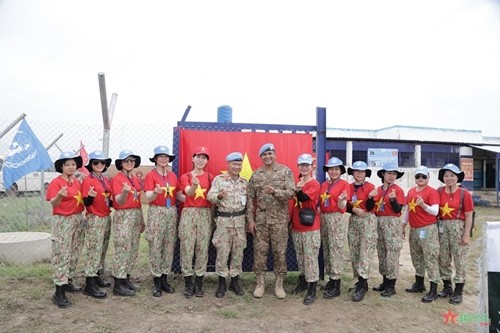Good mass mobilization helps increase people’s trust
Building roads need soil. In Abyei, local people live in tribes, so it is very difficult to get soil from one tribe to build roads elsewhere without getting permission.
    |
 |
|
Female officers of Vietnam’s Engineering Company Rotation 1 in a joint photo with leaders |
According to Lieutenant Colonel Nguyen Thi Lien, a civil-military coordination officer of Vietnam’s Engineering Company Rotation 1, apart from roads, Vietnamese engineers have also helped local people dredge canals and prevent flooding, therefore they often need soil to fill banks.
Though a female, Lien regularly participates in survey trips with other members of the engineering detachment and U.N. mission to handle situations related to local people.
She recalled that there were trips in which participants had to go through long muddy roads, flooded for meters deep that caused vehicles at high risks of overturning and sinking. During these study trips, trucks were use to avoid getting stuck in the mud and Lien sometimes sat on cargo bed or cabin with male colleagues. Getting used to this hard and dangerous work, the Vietnamese female officer is no longer nervous and anxious as before. For her, the more difficult thing is to convince people to not hinder the unit’s work and allow them to get land for road building.
Though experienced with the mass mobilization work while on duty in U.N. mission in the Central African Republic, Lien and her teammates still have to flexibly perform their duties in Abyei due to differences in the nature of the work. Calling on people to cooperate and give soil to build roads is not easy in Abyei. At such times, Lien showed off her talent of mass mobilization. She ate and worked with local people to help them feel her sincerity and understand better about the work of the engineering company. As a result, local people often told her and comrades where to get soil. They also led Vietnamese engineers to places to determine the coordinates of bombs, mines, explosives and check soil for its compression and hardness to make materials for road embankment.
According to Non-commissioned Senior Captain Vu Thi Ha from staff team, there are dry and rainy seasons in Abyei. In the dry season, the weather is hot and sunny, the daytime temperature is often about 40 degrees Celsius, which can cause heat shock at any time. In the rainy season, the roads are muddy and flooded, making it very difficult to move. Moreover, tasks for both male and female officers are often conducted outside the base, sometimes several tens of kilometers away. In field working conditions, they have to overcome the shortage of clean water, electricity, and what they have are often dry rations.
The importance is to create trust and getting affection from local people, Lien said. She recalled that there were times after the flood was successfully controlled, people happily danced and sang right next to the canal, expressed their excitement and thanked the Vietnamese troops.
In Abyei, it is in the dry season when locals face a serious shortage of water. Knowing that, Vietnamese engineers daily carries water tanks to provide water for locals. In the spirit of helping people at their best and from the smallest things, head of the engineering force of Vietnam in Abyei has directed to build houses and give locals whatever they can.
Lt. Col. Nguyen Thi Lien said that the prestige of Vietnamese engineering company has been raised among local people. They find them whenever they get sick for free treatment. Attentively, in task performance, Vietnamese engineers are protected and receive road guidance by local people.
Promoting "soft power"
Non-commissioned Senior Captain Vu Hong Thuy said that once after working with a Pakistani unit, they asked Vietnamese engineers for driving a woman with a four-weeks-old newborn. On the car, the woman looked at everyone with fearful eyes, but after learning that the members are Vietnamese engineers and receiving kindness of female troops, she confidently gave the baby to Thuy to carry all the way.
“Although we could not help that woman much, we women gave her a feeling of peace and warmth,” Thuy said, adding that performing missions in Abyei, they understand more and more clearly the role of women in the U.N. peacekeeping operations.
Sharing with PANO reporters, Non-commissioned Major Nguyen Thi Tam, a member of the engineering detachment 2, said that “each person has a task, but we think that doing our duty well is contributing to a better life for the people of Abyei. Our desire is to create non-muddy roads and smooth traffic so that local people do not have to live in flood when the rainy season comes. In the future, people here will have a better life. That motivates us to work and dedicate ourselves to helping the people here.”
Translated by Chung Anh